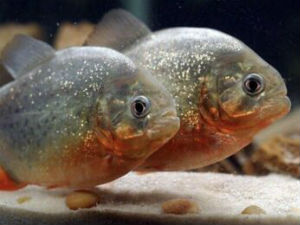
Do piranhas swim in shoals or schools?
 The lurid legend of the piranha conjures up images of ruthless, solitary killers relentlessly attacking prey. However, contrary to their savage mythos, most piranha species actually gather together in organized social groups called shoals. Setting aside their fabricated reputation as lone monsters, piranhas gain significant evolutionary advantages from sticking together and cooperating as a pack. Forming impressive assemblages of dozens to hundreds of individuals allows them to more easily overwhelm prey through group hunting strategies. There is also safety in their numbers against predators. While a few more solitary species exist, social shoaling defines the reality of natural piranha habits and behaviors. Let's delve deeper into why these infamous fish find strength in unity and how shoaling enables their success.
The lurid legend of the piranha conjures up images of ruthless, solitary killers relentlessly attacking prey. However, contrary to their savage mythos, most piranha species actually gather together in organized social groups called shoals. Setting aside their fabricated reputation as lone monsters, piranhas gain significant evolutionary advantages from sticking together and cooperating as a pack. Forming impressive assemblages of dozens to hundreds of individuals allows them to more easily overwhelm prey through group hunting strategies. There is also safety in their numbers against predators. While a few more solitary species exist, social shoaling defines the reality of natural piranha habits and behaviors. Let's delve deeper into why these infamous fish find strength in unity and how shoaling enables their success. Piranhas have a ferocious reputation, but do they roam the rivers solo or gather in groups? It turns out most piranha species actually form large shoals in the wild for hunting and protection.
Safety in Numbers
Shoaling provides piranhas with safety against predators. Gathering in the dozens to hundreds gives an advantage against lone predators through better detection and overwhelming force if attacked. There is strength in unity.Cooperative Hunting
Forming shoals also aids group hunting efforts. Piranhas can corral and overwhelm prey more easily in teams. And injured or vulnerable prey is less able to escape a whole shoal striking at once. Different species employ varying strategies.Exceptions to the Rule
A few more reclusive piranha species like Serrasalmus geryi are more solitary by nature or form only small groups. Some rarely assemble except during breeding seasons. But most piranhas spend much of their time in organized packs.In summary, the common image of piranhas as lone hunters ruthlessly attacking prey is largely exaggerated. Most piranha species gain an evolutionary advantage from shoaling together, whether for protection, hunting, or reproduction. Their strength and success depend on social cooperation in impressive fish assemblages.